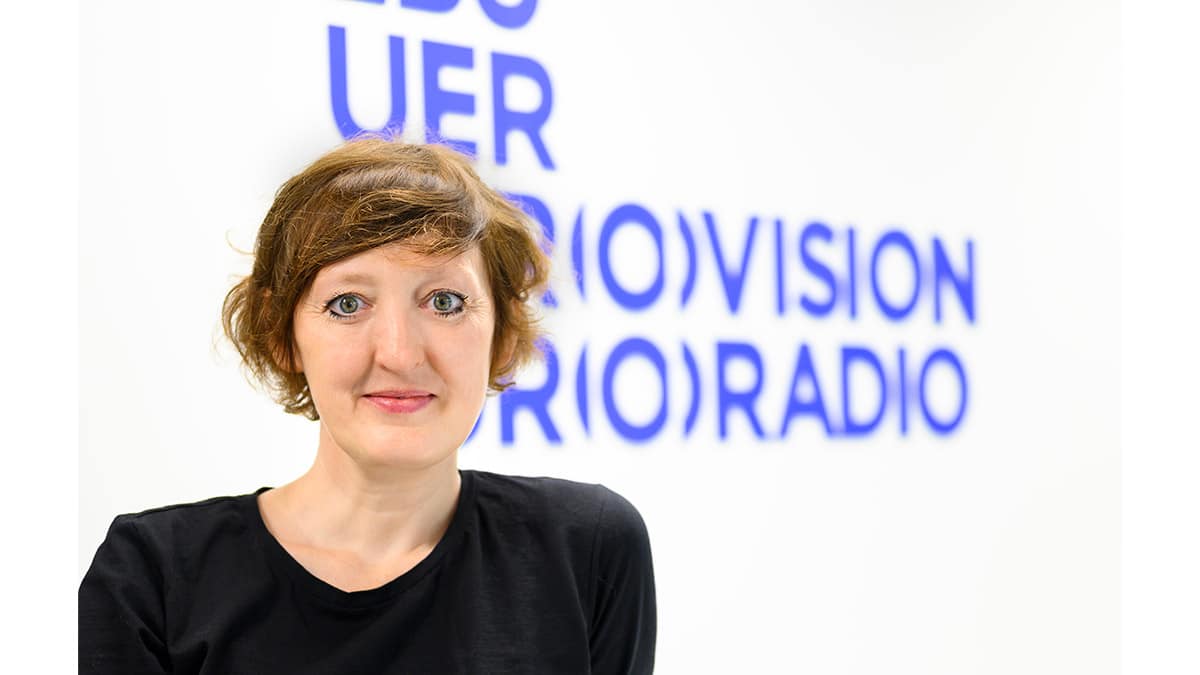The European Broadcasting Union exists to support public service broadcasting in 56 countries across Europe, including Ukraine.
Edita Kudláčová is EBU Head of Radio and faces the daunting challenge of supporting Ukrainian broadcasts during a time of war. The key aim of the EBU is to provide support to broadcasters across Europe. It looks as if this is more necessary now than ever. She provides insight into how the organization is managing this challenge.
RedTech: How are you supporting the EBU members?
Kudláčová: Working together is a great benefit in good times, and crucial during times of crisis. The efforts put into building the EBU community have already proved their worth numerous times. Anyone questioning the relevance of international media collaboration hasn’t seen the role broadcasters play across the world. Particularly nowadays, it is crucial to speak with a unified voice, defend the position of audio and radio and act together at critical moments to support those in need. Our members’ response to the invasion was fast, efficient and tangible.
RedTech: Specifically, how is the EBU supporting radio colleagues in Ukraine? Are you able to remain in regular contact?
Kudláčová: We have maintained contact with colleagues at the Public Broadcasting Company of Ukraine throughout. Support takes various forms. In radio, we are assisting with distribution to help keep radio on-air despite the bombing severely damaging the distribution network. Providing immediate, accurate information to Ukrainians in their own language is crucial for their safety — radio plays a vital role in this. We are investigating further ways to support and maintain the FM/AM network on Ukrainian territory. And then there is the issue of content. Many EBU members re-transmit the Ukrainian public radio live stream so those who have left Ukraine can still access the content. Many of our members embed the programming on their own platforms; this helps disseminate the content along Ukraine’s borders. EBU members are obviously providing coverage of the war. They have all adjusted their schedule since the invasion, and many are providing targeted services for refugees in their countries.
It is crucial to speak with a unified voice, defend the position of audio and radio and act together at critical moments to support those in need.
RedTech: What new services are EBU members in neighboring countries providing the refugees?
Kudláčová: We are speaking at the beginning of April. At this moment, there are over four million refugees, and the number will surely rise. The response from neighboring countries was immediate. They provided news services in Ukrainian for people escaping the country, alongside non-news programs in Ukrainian in many countries to help refugees integrate by accessing financial support, immigration documents, accommodation and schools. Some broadcasters, such as Czech Radio, produce content for Ukrainian children, and culture channels feature Ukrainian music to support the artists and disseminate Ukrainian culture. The Belgian broadcaster RTBF launched a new DAB+ station in Ukrainian, a step several other members are considering. Nationally, there is strong cooperation with humanitarian organizations, including fundraising. Almost every broadcaster has organized a charity concert or similar event to raise funds and generate awareness. This wave of solidarity is enormous — it would be unfair to select a few examples from so much activity.
RedTech: Are the EBU and its members finding ways to tell the Russian public the news that seems hidden from them?
Kudláčová: Given the situation within Russia and restrictions imposed on foreign and independent media, this is not an easy job. But members have not given up. They are searching for efficient ways to do this. For instance, Swedish Radio has launched a daily news podcast in Russian for Russian citizens; they share the content freely via an open API with any media interested in distributing the episodes further. This is a great model for distributing content in regions with strong censorship.
RedTech: It’s said that the first casualty of war is truth. What are the implications of this for public radio?
Kudláčová: I think we are seeing how fragile the online world is. Censorship, hackers, fake news and biased information are all present in this situation. This increases the difficulty and danger for citizens in such an exceptional situation as war. It shows that we need to control the distribution of our content. There needs to be fair rules for online, ensuring platforms are held to account for distributing false information that causes panic or misleads people in extreme situations. We need to safeguard a strong presence for public service media; people need to know they can rely on this information. This is our mission and legal obligation. The authorities must support us in fulfilling our job. Coming back to what I mentioned earlier — public service content must be distributed everywhere without restrictions based on a solid multiplatform strategy. It is not a question of FM versus online; rather, we need to remain strong on a combination of all distribution platforms. Radio and audio are flexible, fast and easier to produce than TV. Radio plays, and will continue to play, an important role.
RedTech: In such a dramatic situation, the distinction between public and commercial media becomes less important. Is this your experience?
Kudláčová: Yes. There is the question of how much our commercial partners can provide, as they are often smaller organizations with fewer technical and content resources. Public radio is often better equipped. But it is important to cooperate on raising awareness, fundraising and robust distribution. I am sure both public service and the commercial sector will learn many lessons.
RedTech: What do you believe will be the long-term impact of the situation on public radio across Europe?
Kudláčová: If anyone doubts whether radio still makes sense, just consider the enormous impact of radio broadcasts informing society through news coverage and supporting humanitarian organizations. It can quickly provide vital information, adapt its program schedule and rapidly start producing new types of content even for regions that might be inaccessible. It is important to control both content and distribution to enjoy a strong position as public service media.
If anyone doubts whether radio still makes sense, just consider the enormous impact of radio broadcasts informing society through news coverage and supporting humanitarian organizations.
Building a strong brand is vital, so people of all ages come to public radio as a reliable source of information. If we weaken this situation, the effect on the whole society would be appalling. I do not even want to imagine that. Radio played a crucial role when my country — Czechoslovakia — was invaded in 1968. This remains the case in 2022, and I do not see anything changing. There are increasing challenges in securing a solid multiplatform distribution, so we need radio to remain universal on connected devices, dashboards and voice-activated devices. We also need transparent rules for the online environment. I hope we will not experience anything like this ever again, but there may be other disasters and situations for which we will need to be ready. Clearly, the people of Europe need public radio, and the EBU needs to ensure it remains strong to meet the challenges.
Graham Dixon was head of Radio at the EBU until 2020, and before that managing editor of one of the BBC’s national stations. He currently advises media organizations, such as Radioplayer and the European Digital Radio Alliance.

